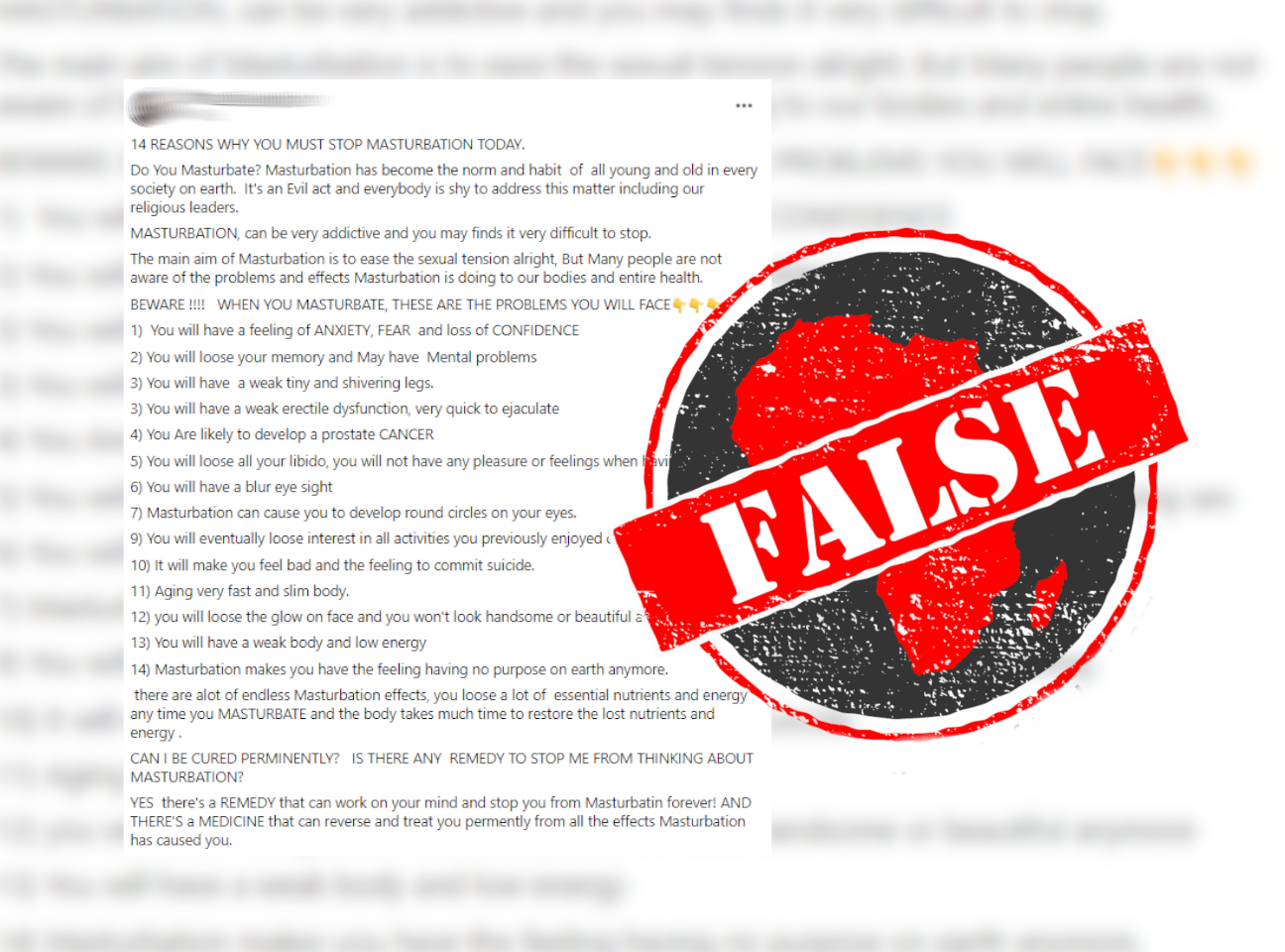“Do You Masturbate?” asks a message posted on Facebook. It adds: “BEWARE!!!! WHEN YOU MASTURBATE, THESE ARE THE PROBLEMS YOU WILL FACE.”
It then lists “14 REASONS WHY YOU MUST STOP MASTURBATION TODAY”.
These include health issues such as “a weak erectile dysfunction”, “very quick to ejaculate” and that a masturbator “is likely to develop a prostate cancer”. The list includes mental health problems such as anxiety and “the feeling to commit suicide”.
Masturbation is the stimulation of the genitals for sexual pleasure, often to orgasm.
Erectile dysfunction is when a man can’t keep an erection firm enough for sex. It is also called impotence, according to the Mayo Clinic, a nonprofit organisation. It can cause stress for men and may also create tension in their relationships if it happens regularly.
But does masturbation cause the health issues listed in the message?

Can masturbation cause erectile dysfunction?
Erectile dysfunction can have either physical and physiological causes, or be a combination of both.
Prof Shingai Mutambirwa is the head of the urology department at the Sefako Makgatho Health Sciences University in Pretoria, South Africa.
He told Africa Check there wasn’t credible scientific proof that masturbation causes erectile dysfunction. “There is no good evidence for this,” he said.
According to John Hopkins Medicine in the US, erectile dysfunction is mainly caused by physical problems, “usually related to the blood supply of the penis”.
Erectile dysfunction can increase the risk of premature ejaculation, which is when a man ejaculates sooner during sex than he or his partner would like. Masturbation can be one way of treating premature ejaculation.
No link to prostate cancer either
What of masturbation causing prostate cancer, a malignant (cancerous) tumour of the prostate, a gland found only in men?
“Definitely not, the reverse is true,” Mutambirwa said. “There is good data that masturbation protects against prostate cancer as most of what a man ejaculates is prostatic and seminal vesicle secretions.”
He added: “It is believed that the more the prostate is emptied, the more the benefit. It does not matter if this is through masturbation or penetrative sex.”
A study by Harvard University researchers found that men who reported higher ejaculation frequency in adulthood were less likely to be diagnosed with prostate cancer. But more research is needed.
Safer than penetrative sex
Are there any known health risks to masturbation? None “of significance”, Mutambirwa said. “As any form of sex is exercise, the act of masturbation will have a protective role in preventing cardiovascular disease and depression.
“When compared to penetrative sex, masturbation is safer as penetrative sex can lead to sexually transmitted infections.”
According to Medical News Today, “most negative effects associated with masturbation focus on how someone feels about the act itself, rather than the physical implications on the body”.
Mutambirwa said if masturbation was causing psychological problems, the person should seek professional help from a mental health expert.
Republish our content for free
For publishers: what to do if your post is rated false
A fact-checker has rated your Facebook or Instagram post as “false”, “altered”, “partly false” or “missing context”. This could have serious consequences. What do you do?
Click on our guide for the steps you should follow.
Publishers guideAfrica Check teams up with Facebook
Africa Check is a partner in Meta's third-party fact-checking programme to help stop the spread of false information on social media.
The content we rate as “false” will be downgraded on Facebook and Instagram. This means fewer people will see it.
You can also help identify false information on Facebook. This guide explains how.


Add new comment